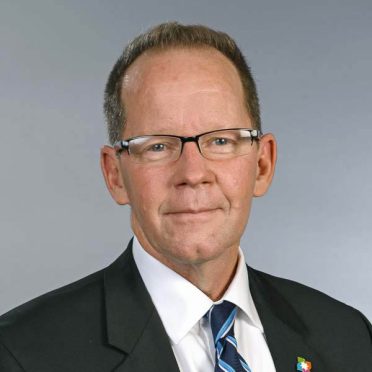Hartford HealthCare (HHC) Friday unveiled a Behavioral Health Crisis Unit, a state-of-the-art, 10-bed private wing adjacent to the Backus Hospital Emergency Department.
The 3,740-square-foot space, designed with safety, privacy and comfort in mind for patients, separates Emergency Department patients with physical health issues from behavioral health patients – making the experience better for all.
> Connect with the Behavioral Health Network
“Put yourself in a situation where you are having your worst day, and things are not really looking good in your life and you can come to place where you have your own private room, you can have peace and quiet, where you are respected and where you are not telling your story right next to someone behind a curtain,” said Kyle McClain, MD, chief of emergency services for Backus Hospital and the Plainfield Backus Emergency Care Center, at a press conference on Aug. 19.
“This is something we really needed for a long time and I want to thank everyone at Hartford HealthCare for helping to make this possible. It took a lot of years, it took a large investment, but this is what our community needed and we are rising to the challenge.”
Mental health, substance abuse needs skyrocket
James O’Dea, PhD, MBA, senior vice president of the HHC Behavioral Health Network, said there is an explosion of mental health and substance abuse issues nationally and locally, but only four out of every 10 patients who need behavioral health care can get it – even though their conditions are largely treatable.
“This crisis happening right now in our country regarding mental health and substance abuse has never been more compelling,” said O’Dea, who worked 25 years in the Backus ED before moving into his current role. “It’s never been more important for us to create access points for people to get involved in care. So while this is a remarkable space, and it is really special, this is really about how do we better engage with our patients, find opportunities for them to get to us so we can navigate them through the care that they need.
“Here’s what we know: For every 10 persons who would benefit from behavioral health care, less than four people get it, which is really a shame because these conditions are actually very treatable. And we know how to give really good care, and we know that when we provide really good behavioral health care we see impacts, not just in improvements in our patients and in our communities, we also see that the rest of their health conditions also improve when you treat those underlying health conditions,” O’Dea said.
Built for safety, comfort
Highlights of the facility include:
- Rooms are in close proximity to nursing stations, allowing for constant observation
- Rooms include measures to prevent-self harm
- Cameras
- Panic buttons
- Water shut-off
- Quick disconnect shower wands
- Appropriate lighting
- Ice machine
- TVs
- Blanket warmers
- Refrigerators
Doors to open soon
After it receives final Department of Public Health Approval, the unit will open to patients in early September. The project is part of a larger investment in behavioral health resources in Eastern Connecticut by HHC – just 15 miles up the road, the HHC Behavioral Health Network plans a private, residential substance abuse facility off Route 32 in Windham. Scheduled to open by Jan. 1, The Ridge Recovery Center will offer standard addiction services such as detox and group therapy in a residential setting that includes private rooms, meeting space, a gym, walking trails and alternative therapies such as yoga.
Backus Hospital vice president of patient care services Colleen Desai, RN, said that in a recent Community Health Needs Assessment, behavioral health was among the top healthcare issues in Eastern Connecticut, which is why they pursued the behavioral health crisis unit.
“We’ve listened to what the community needs are, and we are extremely proud to be in a position to address those needs,” Desai said. “With this new unit, we can now provide an even safer, more dignified experience for our patients who will have access to high quality, coordinated care, in a more comfortable and therapeutic environment, which will help them recover more quickly.”




